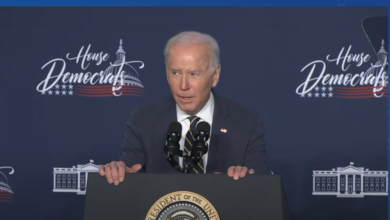Biden Admin Funded Both Sides Of Growing Israel-Iran Faceoff

The Biden administration has been a major benefactor for Israel and Iran, two countries that have launched direct attacks against each other in recent weeks.
Israel launched a series of strikes against targets near central Iran Friday morning local time, in retaliation for Iran’s missile and drone attack against Israel days prior, which was largely unsuccessful. Israel has received billions in military aid from the Biden administration both before and after Oct. 7 — the day Hamas invaded the country and killed nearly 1,200 people — but Iran has also financially and militarily benefitted from the Biden administration’s policies prior to its direct conflict with Israel.
Israel has received over 100 military aid packages from the U.S. since Oct. 7, though only two crossed a value threshold that required public notification, which totaled roughly $250 million. This includes artillery shells, rockets, bombs and precision munitions; the Biden administration is asking for an additional $14.3 billion in aid for Israel from Congress as part of a larger supplemental request for aid to Ukraine and the Indo-Pacific.
Military aid to Israel may be in jeopardy, however, as the Biden administration has warned that its policies will change if Israel does not change its strategy against Hamas in Gaza.
“It looks increasingly like Biden won’t be funding both sides if some Democrats looking to cut off military support to Israel get their way,” Mark Dubowitz, CEO of the Foundation of Defense for Democracies, told the Daily Caller News Foundation. “Iran has financially benefitted from the Biden administration through a $6 billion ransom payment, $10 billion sanctions waiver and tens of billions in oil revenues because of the absence of sanctions enforcement.”
As the world’s largest state sponsor of terrorism, Iran is heavily sanctioned by the U.S. and international community, specifically in its lucrative oil and energy sectors. The Biden administration hasn’t formally rolled back sanctions against Iran’s oil exports, but has chosen not to enforce them as strictly as the former Trump administration; as of September 2023, Biden’s Homeland Security Investigations had not seized an Iranian oil shipment in over a year, despite such actions being the agency’s chief responsibility.
The Biden administration has also directly unlocked funds for Iran. In a deal brokered in September 2023, the Biden administration unfroze $6 billion in Iranian assets in exchange for five American prisoners who were being held in Iran.
Though the Biden administration maintained that the $6 billion it unfroze for the five American prisoners could only be used for “humanitarian purposes,” such as food or medicine, experts previously told the DCNF that it did not matter because money is fungible; Iran could free up $6 billion in unrestricted funds it already had in its reserves.
“Of course the money is fungible, and the administration hasn’t given any discernible reason why it isn’t,” Michael Bars, former White House senior communications advisor and National Security Council official, told the DCNF.
Tehran said that regardless of the Biden administration’s terms, it would use the money “wherever” it wanted. “This money belongs to the Iranian people, the Iranian government, so the Islamic Republic of Iran will decide what to do with this money,” Iranian President Ebrahim Raisi said during a September interview with NBC.
“Biden’s disastrous foreign policy has emboldened the Iranian regime by easing President Trump’s ‘maximum pressure’ sanctions that left Iran broke,” Bars told the DCNF. “Iran’s unprecedented attack on Israel was catalyzed after months of Biden-Blinken hand-wringing and threats of slowing or pausing arms transfers to Israel, which have clearly impeded the U.S. ally’s ability to counterstrike Hamas when and how it would prefer.”
Iran’s oil exports have hit the highest level seen in six years, exporting nearly 1.8 million barrels of oil a day and raking in an estimated $35 billion for Tehran in 2023, according to the Financial Times and FDD. Iran has drawn in over $100 billion in oil exports since President Joe Biden took office in 2021.
Under the former Trump administration’s “maximum pressure” campaign, Iran only exported nearly 400,000 barrels of oil per day.
“The question for the Biden administration is whether they have any incentive to utilize the sanctions architecture that the Trump administration used to take down Iran exports,” Helima Croft, global head of commodity strategy at RBC Capital Markets, told FT.
The Biden administration has also allowed Tehran continued access to $10 billion in previously frozen Iranian electricity revenues from Iraq, most recently renewing the access in March. Though the policy was first instituted in 2018, the Biden administration allowed the funds to be transferred to a bank in Oman to be dispensed to Iran.
“This is not the same waiver for Iraqi electricity imports that has been issued since 2018,” Richard Goldberg, senior advisor at FDD, said in a statement on Wednesday. “This is an Iran sanctions relief waiver that allows Tehran to access money and use it for budget support, including debt payments and import subsidies. That was not allowed prior to last summer.”
On a military front, Iran was able to resume its ballistic missile and drone testing programs ten days following the Oct. 7 attack after the Biden administration allowed United Nations sanctions against the programs to expire. Tehran was also allowed to start transferring weapons to other nations, including Russia, which has profited from Iranian drones in its ongoing war against Ukraine.
In light of Iran’s recent actions in the Middle East and direct attacks against Israel, the Biden administration is preparing new rounds of sanctions against Iran’s missile and drone programs and its oil exports.
When asked repeatedly what Biden’s message is toward Iran if the country is considering attacking Israeli or U.S. forces, Biden often answers with one word: “Don’t.” Biden pressured Israel not to respond ahead of the strikes against Iran on Thursday, even as the threat from Tehran and its neighboring terror proxies pose a constant and evolving threat. It is still unclear how Iran will respond to Israel’s strikes.
“Tehran is pleased that Biden’s ‘Don’t,’ a warning ignored by Iran, is now being directed against Israel,” Dubowtiz told the DCNF. “Those Western countries insisting that Israel’s air defenses are sufficient to rebuff Iranian ambitions forget that while the Israelis share our liberal democratic order, they do so in a tough and merciless neighborhood.”
The White House did not immediately respond to a request for comment.
Content created by The Daily Caller News Foundation is available without charge to any eligible news publisher that can provide a large audience. For licensing opportunities of our original content, please contact licensing@dailycallernewsfoundation.org




